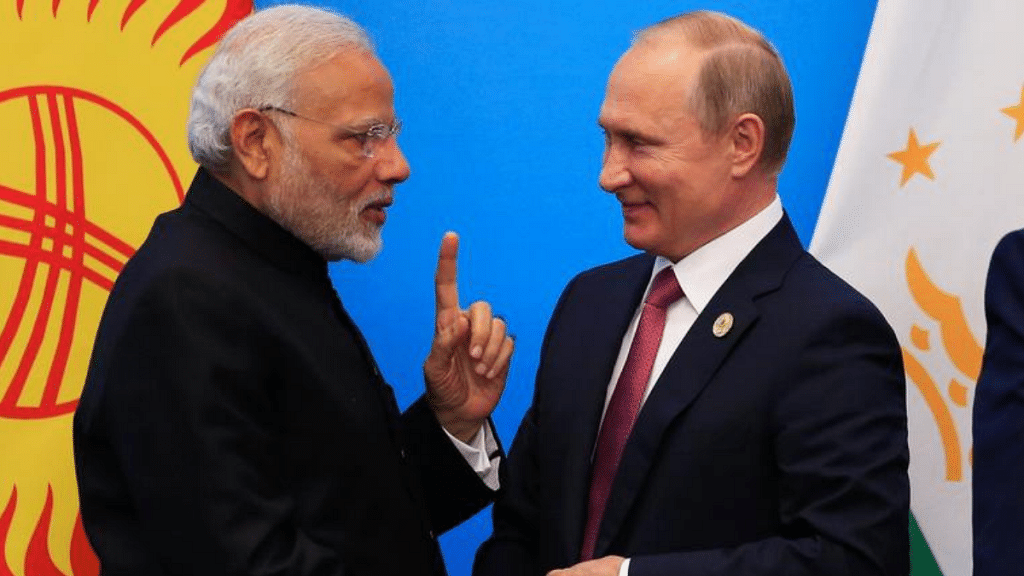On 23 February, India once again abstained from voting on a United Nations resolution related to the Russia-Ukraine conflict. New Delhi has greatly expanded oil purchases from Russia, and, in effect, has helped Moscow finance its invasion at a time when Europe has sharply cut back on purchases. Foreign policy experts suggest that the Indian support for Russia is on account of two reasons — our long-term strategic relationship with Russia and the aim to reduce the extent to which Russia becomes bound to China. But by supporting Moscow, New Delhi is running the risk of being alienated by the West. What is the economic perspective that should be brought into this story?
Economics and foreign policy
State coercion limits engagement between individuals in two countries. Governments make such decisions based on a balance of economic interests and foreign policy. One arena where this plays out is visa diplomacy. Denial of visas is a lever of international relations and often used as a tool to influence actions by another State. Europe has often used relaxed travel conditions as a tool for readmission to the European Commission. The United Kingdom granted 3,000 visas for Indians in November 2022 after Prime Minister Narendra Modi met UK PM Rishi Sunak. Another important tool is trade agreements. Such deals have big consequences for developing countries because they can impact a nation’s economic growth. Trade agreements may sometimes be driven primarily by geopolitical and strategic reasons. An example is the 2015 Australia–Japan free trade agreement.
In a globalised world, cooperation between countries extends to multiple arenas. An example is the recognition of central counterparties (CCPs) in financial markets that allow investors to invest and trade in financial assets. If these fail, then a country runs the risk of becoming less competitive for foreign investors. Another example of cooperation is the United States-India initiative on Critical and Emerging Technologies (iCET), which will form the basis for the framework for collaboration between the two countries in many respects. The energy, support, and prioritisation for all these initiatives on the part of the two governments are shaped by their security environment. This has major implications for people living in both countries.
Also read: China’s eye is on Russia, India must decide how much it can depend on…
India’s interest lies with the West
In FY22, India’s total exports amounted to $422 billion. Of these, 24 per cent were to the Americas, while 21 per cent were to Europe — almost half of India’s total exports, therefore, were tied to the West. In the same year, the share of Russia was 0.7 per cent while that of China was 5 per cent. Services exports is where India shines — they are now bigger than goods exports. Indian services exports go almost entirely to the West; with Russia and China, they are negligible. Information Technology is now India’s biggest industry, and the future of the Indian economy is tied to success in this sector. For further doubling of services exports, support and cooperation from Western governments is important.
Western universities are key destinations for Indian students. According to the Ministry of External Affairs, a total of 11,33,749 students went overseas in 2021. Of these, 51 per cent went to Australia, Canada, the UK and US; 2 per cent went to China and 1.4 per cent to Russia. In 2022, Indian students received more US visas than students in any other country. The aspirations of young Indians are tied with the West and not the Russia-China axis.
Work visas are important for Indian IT giants such as Wipro, TCS, and Infosys to be able to service Western markets. The decision of the Donald Trump administration to temporarily suspend the issuance of H-1B visas in 2020 had caused much anxiety for the Indian IT sector. The current lay-offs in the tech sector in the US have brought together technology professionals associations to influence policymakers and decision-makers at US Citizenship and Immigration Services (USCIS). India’s approach to the Ukraine war will shape the extent to which Western governments choose to support India’s services exports growth targets.
Firms are as important as governments in making material decisions — they run the global production system. The decisions of the board of directors of the top 1,000 global companies impact India’s future in a major way. If global firms want to exit China on the grounds that it is an authoritarian country hostile to the West, then it is in India’s interest to look ‘un-China’ in the eyes of the world. Our equation and policies vis-a-vis Russia may shape the attitude of these global corporate players.
Foreign policy is a balancing act. Multiple considerations go into arriving at a country’s position — India must do the same with regard to the Ukraine-Russia conflict. Most of us in India think that this is not our fight or that our current stance will not cost us. But India’s economic interests lie with the West, and the latter is extremely worried about Russia’s invasion of Ukraine.
Renuka Sane is research director at Trustbridge, which works on improving the rule of law for better economic outcomes for India. Views are personal.
(Edited by Humra Laeeq)
